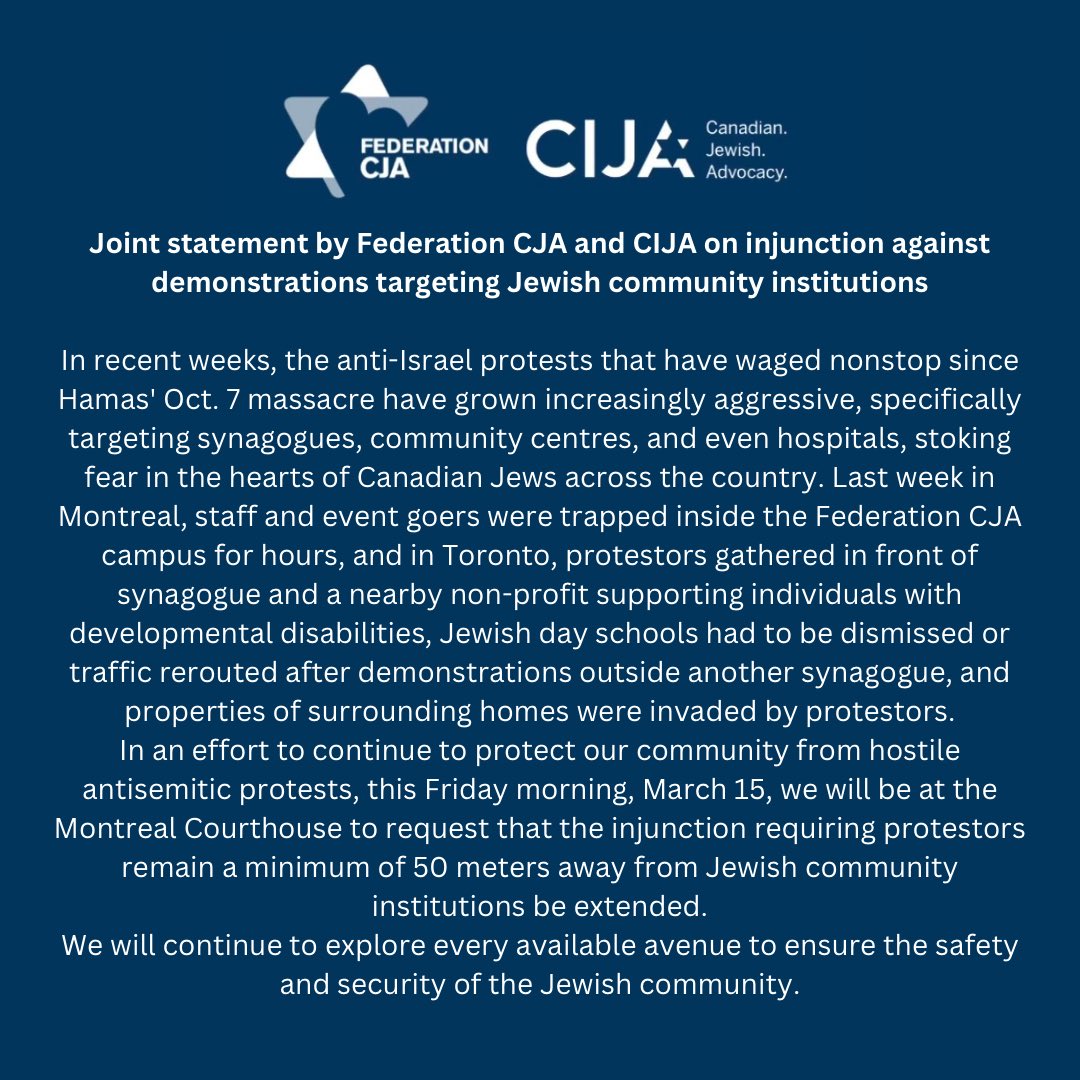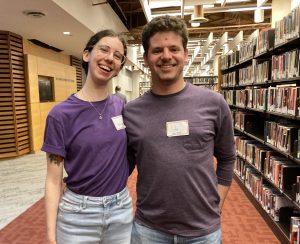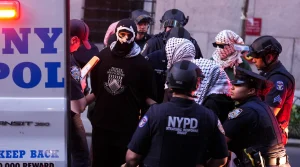Protests directly in front of a specific set of Jewish buildings in Montreal remain off-limits, by law, after a Quebec Superior Court judge extended an injunction on March 15.
The decision comes 10 days after two consecutive nights of aggressive demonstrations that left many community members shaken.
The period for the extension of the injunction appears to be about one month, until early April.
Federation CJA and Montreal’s Spanish and Portuguese Synagogue sought out—and were granted—the initial injunction after protests on March 4 and 5, one of which resulted in the arrest of two men for assault.
That provisional injunction, issued March 5, named Independent Jewish Voices, Montréal4Palestine, Palestinian Youth Movement, Alliance4Palestine and Bara Iyad Abuhamed.
The extension renews a court-ordered prohibition against those groups, and anyone affiliated with them, from protesting within 50 meters of the Federation CJA building, the Spanish and Portuguese Synagogue, the Cummings Centre, the Sylvan Adams YM-YWHA, Herzliah High School, and United Talmud Torahs of Montreal.
The protest that led Federation CJA to file the injunction took place in front of its own building March 4, when hundreds of pro-Palestinian protesters blocked the entrances and prevented people from attending an event that featured three IDF reservists. Those who were able to attend the event were then stuck in a dark room, unable to exit the building safely for hours.
Another protest took place in front of Montreal’s Spanish and Portuguese Synagogue, which was holding an Israeli real estate event on March 5. The protest was met with a heavy police presence and lasted a few hours. Montreal police (SPVM) were able to keep protesters and counter-protesters separate and no incidents were reported.
Lawyers for Federation CJA and the parties named in the injunction appeared in a Montreal court Friday, March 15, where the determination was made.
The injunction decision came after two eventful days in the Montreal Jewish community, after a protest at Concordia University over a Tel Aviv University professor visit turned to aggressive harassment of students inside the Hillel Concordia lounge.
In addition, planned fortifications to several Jewish institutions were announced March 14, following a new round of funding via the federal Security Infrastructure Program.
In recent months, two separate Montreal Jewish schools were shot at twice, while empty at night, and a Jewish community centre was fire-bombed with a Molotov cocktail.
Yair Szlak, CEO of Federation CJA, addressed community security, including the injunction and the Hillel Concordia incident in a statement following the court decision. Szlak wrote of the need the organization saw after the March 4 protest “to ensure the safety of our community and safe access to our institutions.”
“In granting the initial injunction, the judge recognized this absolute need for protection against protests of this kind, and created a buffer zone to ensure protestors were kept at a safe distance,” the statement read.
“We requested an extension because nothing has changed. The protest at Hillel Concordia proved this. The priority will always be to ensure the safety of our community.”
In a joint statement, Federation CJA and CIJA focused on the safety of community centres, schools, and houses of worship.
“We are glad the court extended the injunction, continuing the safe buffer zone, which it established to protect our community and its institutions,” the statement read.
“It has become all too clear that demonstrations at these locations are about stoking fear in the hearts of Canadian Jews, and not about a war happening on the other side of the world.
“While the right to protest is deeply rooted in our values as a society, this does not include the right to intimidate and threaten our community, and this is what this injunction is about.”
The statement concludes by saying the organization seeks a permanent injunction.
Eta Yudin, Vice President of CIJA, told The CJN in an interview that the rights of protesters remain intact, with limitations.
“They can still protest… they have to do it 50 metres away from those institutions, so that the kind of scene that played out (March 4), where Jewish community members attending events or work in the heart of the Jewish community in the federation building, can feel safe and access and exit the building freely, regardless of a group of people expressing their opinion on an issue,” she says.
“We see where some of these protests lead,” says Yudin. “We’ve heard for months, and and we’ve called it out unequivocally that the chanting of ‘death to Jews’ and hate messages in the street, unchecked, will lead to escalated behaviour.”
She says the March 4 protest was not “a group of people peacefully holding signs,” and that protesters aggressively blocked exits and entrances, “intimidating, harassing, and in in some cases actually aggressing the Jews who are outside the building.”
“You had people trapped inside the building for over three hours, unable to leave and unable to get in. And that is just unacceptable,” says Yudin.
That intimidation reached Hillel Concordia students on March 12, too, the organization says.
Hillel Concordia in a statement wrote that its students were targeted, bullied and harassed while inside its space on campus.
“Masked cowards banged on the walls, trying to intimidate them through the window by using the fire escape stairs, and chanted ‘All Zionists are racists, all Zionists are terrorists’ outside,” the statement read.
“This came shortly after protestors blocked access to a talk at Concordia by a Tel Aviv University professor, something to which the students had no connection.”
Yudin says Federation CJA will continue to advocate for Jewish students with university administration, at Concordia and other Canadian universities struggling with antisemitism largely showing up in the form of anti-Israel protests.
“We will continue to convey our profound concerns about what our students are experiencing on campus, and calling on [universities] to take action to hold those who seek to foment and site spread hatred on campus, and take [to] these kinds of activities, to make sure that they’re held accountable,” she says.
“The kinds of behaviours that we’re seeing, we need as a society to send a strong message that they are not tolerated. These are not acceptable ways of expressing, opinions, by targeting other groups, by targeting the Jewish community in this way and that those responsible will face real consequences,” she says.
In a statement, Independent Jewish Voices (IJV), a Canadian group supporting boycott and sanctions against Israel, says they are fighting the injunction in which the group is named.
“IJV is fighting Federation CJA’s injunction against us and the movement for Palestinian liberation. As the defendant, we have asked repeatedly to see what evidence was used to obtain this order,” read the statement issued March 15.
IJV’s motion to ask the court to release Federation CJA’s evidence is scheduled for Tuesday morning, March 19.
In its statement, IJV agreed to an early April hearing date “to give us time to review the evidence, which will extend the injunction to that time.”
IJV says the synagogues and Jewish buildings were being protested for events they hosted, and not as Jewish cultural or religious spaces.
“Last week, we protested a speech by recent-duty IDF soldiers, hosted in the Gerber Centre, after the event was canceled by Concordia University. The next day, we protested a real estate tour advertising illegal Israeli settlement properties, hosted in a synagogue. It is these events, and not the fora, that were the targets of the protests.”
“These protests are acts of solidarity, co-organized by Jews out of love for our community and justice-oriented traditions that do not allow us to stay silent when our siblings are being persecuted,” the statement said.
Canada’s antisemitism envoy, Debra Lyons, attended the courthouse March 15 in support of the injunction, as did Mount-Royal MP Anthony Housefather, who announced the renewed Security Infrastructure Program funding one day earlier for a number of Jewish schools and buildings in his Montreal riding.
“At a time where antisemitism has reached a scale we have not seen in our lifetime, we need to ensure that communities can protect and secure their buildings and hire security guards,” Housefather wrote in an email to The CJN.
Housefather welcomed the extension of the injunction, and says he’s looking toward long-term solutions.
“We should not need an injunction to have police move demonstrators far enough away from buildings to let people enter and leave and not be intimidated, but in Montreal that is where we are,” he wrote.
“We need the injunction to be extended and hopefully made permanent. But the longer term issue is we need a clear understanding of where one group’s rights to demonstrate end. And they end when they take away the rights of others.”
Housefather says it’s up to police to ensure protests don’t interfere with or intimidate people coming and going from the buildings.
“You cannot exercise your free speech rights to remove those of others,” he says.
The Concordia incident on March 12 and the March 4 protest involving demonstrators blocking entrances to the Federation CJA building show the need for universities, local police, and municipal leaders to step up, says Housefather.
“Universities need to make sure their codes of conduct provide equal protections for Jewish students, staff and faculty and they must be enforced.”
Author

Jonathan Rothman is a reporter for The CJN based in Toronto, covering municipal politics, the arts, and police, security and court stories impacting the Jewish community locally and around Canada. He has worked in online newsrooms at the CBC and Yahoo Canada, and on creative digital teams at the CBC, and The Walrus, where he produced a seven-hour live webcast event. Jonathan has written for Spacing, NOW Toronto (the former weekly), Exclaim!, and The Globe and Mail, and has reported on arts & culture and produced audio stories for CBC Radio.
View all posts








